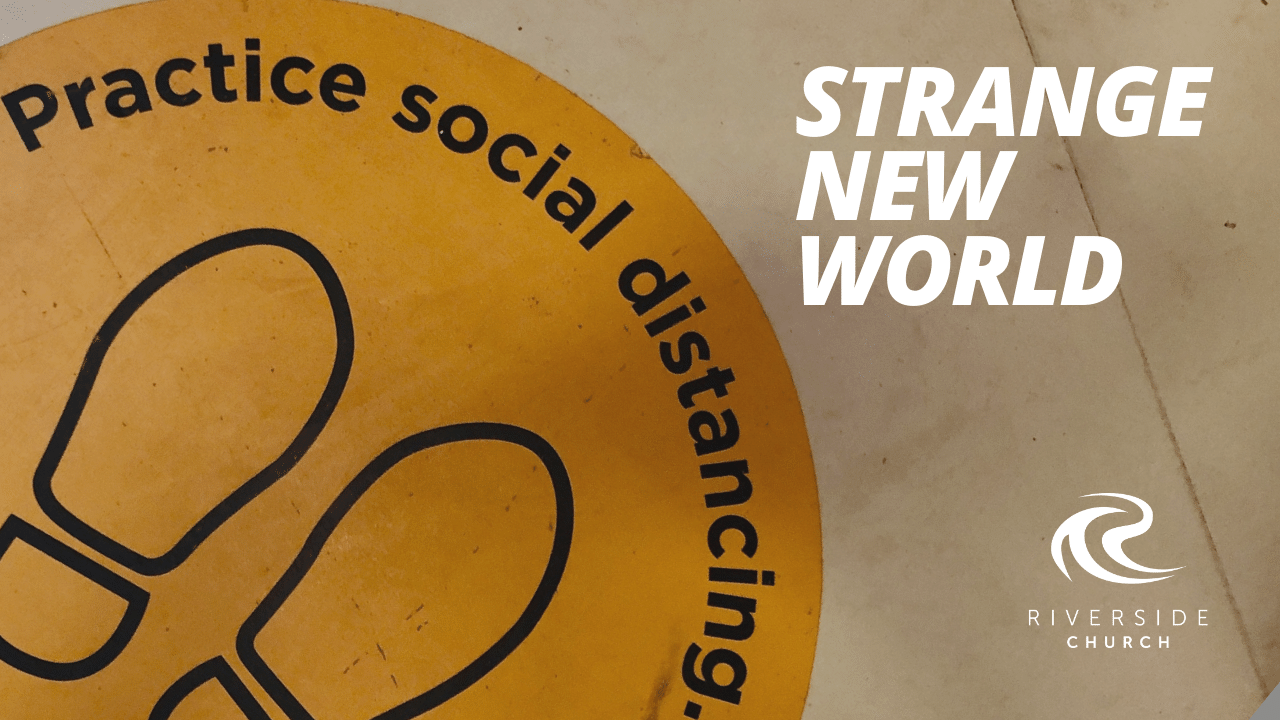Teaching Series Introduction:
It’s a strange new world. When the world is all topsy-turvy, what difference does Jesus make in our lives? From the book of 1 Peter, we will rediscover the importance of being ‘strangers’ with purpose who make a difference in our world, all because Jesus first came to bring blessing and hope to us.
Session 6
Title: Be Who You Are
By: Judy Moore
Date: 11 October 2020
Bible Passages:
1 Peter (Chapter 3, verses 1 to 12)
Summary:
How does Jesus impact our relationships? In every way! But its not always easy…and that’s why we are called to remember who we are because of Jesus. And this then changes every relationship, including those closest to us.
Children’s Resources:
Youth Resources:
Resources are sent out to all parents each week. If you are not receiving these emails or would like to know about how you can get connect with our youth please contact: johng@riverside-church.org.uk
Transcript:
Well, good morning, everyone. And welcome to this next episode in our series ‘Strange New World’. We are looking at this first letter of Peter, 1 Peter 3, and looking at how do we love distinctively in a foreign land. How do we, who believe in Jesus, or we who are seeking him, how do we find a love that we can live by, that we can live out, that is compelling, that is attractive? And Peter has found it. Peter is somebody who was with Jesus for three years, following him as part of his team. So he has caught something, in that he knows what this love looks like. And I suppose now, as much as at any time in our lives and in our history, there’s a longing in us to excel in love, because we see a world that needs love, that needs the sort of compassion that Peter is talking about. And at several weddings that, certainly, I’ve spoken at, we often talk about love being a choice. It being a decision rather than an emotion. Love is a doing word, if you think back to school days, perhaps. But we don’t always realize that it can be a verb in how it plays out in our lives.
And he starts off by looking at love within marriage in the early part of this letter, looking at how husbands and wives can interact. And I’m not going to say a lot on that, I’m certainly not really an expert on that. But I was reading Eugene Peterson talking about marriage. He talks about it in The Contemplative Pastor. And he talks about the difference between wilfulness and willingness. And I thought that was really helpful, that as we love, and as we love relentlessly and resiliently in marriage, or in relationships that might hit walls or become troublesome for us, this sense of being willing rather than wilful, I think is a really helpful little measure. Because Peter is saying, “Have an opposite spirit.” He’s saying, “Don’t repay evil for evil, but bless even when there’s an argument, even when you feel wronged. Try and find this opposite way, this opposite spirit.”
And he talks about that in many different ways, but I thought it would be good to just think about, in relationships that we are in at the moment, what does it look like to be willing rather than wilful? Because what wilful does is it locks horns. It just sort of sticks in, where, “This is my road and I’m not going down any other.” But willingness is willing to listen. It’s willing to be humble. It’s willing to hear the other person’s perspective. And gentleness is a beautiful thing in relationships. And it’s part of the love of Christ that we want to breathe in, that we want to absorb.
Interestingly, he talks about, there’s a couple of verses that we had read in verses three and four, about how the women of the day were getting into adorning, they were getting into big hair with big gold weaved through it apparently, and their hair was getting bigger and bigger. And that’s why Peter sort of talked about it. But I think there’s a message for men and women, certainly. But he says, “You’re spending all this money on beauty”, and he uses the word “adornment”, which in the original text is “cosmos”, it’s where we get cosmetics from. And cosmos was the opposite of chaos. So he says, “In other words, you’re using all these external things to try and limit the chaos and beautify.” But actually, he says, “There’s an inner re-ordering of beauty that comes from a gentle spirit and a quiet spirit.”
Now, it’s difficult, isn’t it? I know sometimes we get accosted, certainly as women, if you’re walking through [inaudible 00:00:06:21], or somewhere, and someone sort of accosts you and says, “Oh, what’s your beauty routine?” You’re not necessarily going to say it’s a little bit of gentleness and a bit of a quiet spirit. But there is something that I think we resonate with, perhaps even more now than ever before, that really what matters is our internal; the feeding, the drinking in that feeds the inner self towards beauty, towards love, towards humility, and towards this love that Peter describes.
And my second point really is, we really do need to see with the eyes of God. Jesus saw people in a completely different way to the other people around him. He saw them differently. There’s a beautiful quote from Thomas Merton, who says, “Our job is to love others without stopping to inquire whether or not they are worthy.” In other words, as we pray, as we pause at times like this, how can God help us love the unlovely? Because we know that he has loved us, and we feel unlovely sometimes, and yet he loves us. And the Christian faith, I believe, is a brilliant, brilliant, beautiful transaction that we who are unlovely are loved into acceptance, are loved, if you like, into loveliness, so that we can go and love, excel in this love.
I heard an account that I’d heard before, but I was reminded of it just this last week on Facebook, of the very lovely Desmond Tutu when he was growing up under apartheid in South Africa. And there was a horrific tradition that used to happen when black people were walking along the road under apartheid. If somebody white would come towards them, they would be obliged to step onto the sidewalk in order that the white person could pass by. And he was used to this. He was a nine year old boy and he was walking along the side of his mother, and coming towards them was a white Anglican priest by the name of Thomas Middleton. And as he got close, he immediately stepped aside into the sidewalk to let Desmond Tutu and his mother pass. And not only did he do that, but he docked his cap in reverence to Desmond’s mother.
And Desmond Tutu describes that moment as a seminal moment where he decided that, “If that is what love looks like, I’m following that. If that is what it’s like to honor someone, if that is what it’s like to live in this different way, this distinctive, opposite spirit, then I’m in.” And actually, Thomas Middleton, in later life, became a mentor for Desmond Tutu, because he decided to follow in that way. He decided to become an Anglican priest in the same way that Middleton was.
And in that simple act, I think we can all breathe a little bit, because what I don’t want is to read this passage and think, “Oh no, must try harder. Must do better.” Because we’ve called this particular session “Being free to be ourselves.” Free to be ourselves. And in a way, what Middleton did there, he would never have known, he couldn’t have conceived, that just in doing something against the flow, he would start this sort of contagion, if you like, of love, radical love.
Because I believe that love can be subversive. And I believe there’s a call in us, as followers of Christ, where if you’re looking at what love could look like in your life, this love of Jesus that he has for us, no doubt, how do we live in that opposite spirit? What does the sidewalk represent, if you like, for us this week? What is the way that we can surprise people by reacting completely differently to perhaps what instinct would tell us to react with? Because Peter talks about, “Love one another in a way that is like-minded, in a way that is sympathetic, compassionate and humble.” And he says, “Don’t repay evil with evil or insult with insult.”
And this is the way of Christ. The way of evil is to sort of repay evil, isn’t it? Or to even repay good with evil. The way of humanity is to, in a way, repay good with good or evil with evil. But the way of Christ is different, because it says, “I will repay evil with good. I will repay evil with good.” In fact, our whole faith is based on the fact that sin and what we do wrong is repaid with the death of Jesus Christ, is repaid with love and forgiveness and grace. And as we are loved, we will be changed. If you like, yes, love is a doing word, but it’s also a being word. We become love when we have Jesus Christ in our lives.
Now, you might look at the church, and many of us do, and think, “Well, it doesn’t look enough like that.” Or we might look at our own lives and think, “It doesn’t look enough like that.” And the danger with that is we become judgmental. We become judgy, because we enjoy it, don’t we, sometimes? If we say, “Oh, the church isn’t doing enough”, or, “That person isn’t doing enough”, or, “I don’t agree with the way that person is dealing with COVID or dealing with lockdown … ” And I can honestly say sometimes I’ve found that rising up in myself, that we’ve become a bit judgy because we’re going it a certain way and others are going it a different way. And it’s an easy time, if you want to be critical of church, it is an easy time to do it, isn’t it? It’s an easy time to sort of be a spectator.
But this love that has found us doesn’t really allow for that. It says, “Be united.” Just because perhaps you’re watching church online and there’s a sense of being removed, don’t become a spectator. Because you will become a critic, it’s so easy to do. But actually, he says, “No, stay united, stay united.” Not uniform, because we are celebrating the fact that we’re diverse and different and multifaceted. But the challenge, nevertheless, is stay together because we are on a journey that we have no idea what’s going on a lot of the time, so there’ll be much to criticize, but we are motivated by love. We’re motivated and compelled by love. And our heart is to stay together. Our heart is to have this unity that Peter speaks of. He says, “Stay like-minded, sympathetic and loving one another, compassionate and humble.”
And he says, “Whoever would love life and see good days, keep your tongue from evil.” Now this is a challenge, this is a big old challenge, because for those of us who like to chat, and I’d certainly be one of those, our tongue can run away with us, can’t it? But there are beautiful Psalms in the book of James, and I think it’s Psalm 34, all that talk about putting a guard on our tongue that we might speak well of one another and therefore of Christ, that there would be something salty, something distinctive, something that creates a thirst in others in how we love and how we speak.
And we’re going to come and take communion in a little bit, but I wanted to close really with a very simple little parable from my own life at the moment that I hope will inspire you and encourage you, because we want to be loving, don’t we? We want to excel in love. I don’t think there’s a person tuning in or in the room that doesn’t want and crave to be more loving, to be more beautified from within, as Peter says, here. But we know that we fail and we know that we falter, and we know perhaps at the moment that we’re a bit more fearful or a bit more introspective.
But there’s a lovely analogy. We have a spaniel family dog who’s called Poppy, who’s getting really elderly now. We had her as a puppy, and my sister and family have had her for many years, and she’s become very much part of all of us. And she’s always been quite a gentle dog. Although, when she was a puppy, of course, as a Springer Spaniel, she was boisterous. But she is now almost blind, pretty deaf; although, you can raise her if food is in the offing. And she sort of staggers around, particularly if she’s not in her own home or doesn’t know where she is.
But what she does brilliantly is she kind of sniffs one of us out, where she is known and where she is loved. And her whole body, you find, leans in to you, to your leg. And she snuggles right in and just stays there. And when she’s stayed there for a really long time, then she feels able perhaps to re-navigate the kitchen or wherever it is that she’s heading. But she has this sense of stopping and leaning in.
And I’ve felt many times in these last few weeks that that’s been a little bit of a parable for me; that we are a bit blinded at the moment. We certainly are a bit unable to see the way forward. We’ve lost our bearings a little bit. We’ve lost our course, you might say. But if we lean in to God, if we pause, if you, tuning in, maybe even for the first time, say, “I want to receive this love. I want to just pause and say, ‘I receive the love of Jesus and I want to live radically, subversively for him.'”
And there’s some words that I thought might help us, that we read as a leadership team on Monday night, that Jesus himself said, when he was sending out his team, his team of 72. And he wanted to remind them to come as children. He wanted to remind them that actually all the leaders were confused, all the Kings were confused. And certainly, we might feel that globally a little bit at the moment. But he says, “You have got the eyes to see people differently. You have got the ears to hear what others can’t. Why? Because you are part of the kingdom of God.” And if we’re part of this subversive kingdom, then actually, we will see people differently. We will hear differently. And God willing, we will speak differently. We will speak well.
And he says this, “I praise you, father, Lord of heaven and earth, because you’ve hidden things from the wise and learned, but revealed them to little children. Yes, father, for this is what you were pleased to do.” And he turned to his disciples and said, “Blessed are the eyes that see what you see, for I tell you that many prophets and Kings wanted to see what you see, but they didn’t see it, and hear what you hear, but they couldn’t hear it.”
And I thought, as we close, I’d love to pray that for us, that we would see things differently, that we would hear things differently, because we’re leaning in, because we’re pausing, because we’re waiting. But also that we would speak differently. As Peter says here, “That our words would be different and uplifting and distinctive, because we’ve breathed in and lent in to this beautifying love.” So let me pray for us.
Father, we want to thank you that you have first loved us. That Peter, who is writing this letter, knew what it was to be loved in spite of his failings, to be loved in a way that was so subversive and so compelling that he had watched how you did it, God, and then he went out and lived love as a doing word, love as a being word. And Lord, that is our prayer, that we would become more compassionate, more united, and that as we lean into you, Lord, and your refreshing love, your uplifting love, that we would excel in love in this world differently, in stepping into the sidewalk, in having an opposite spirit, in honouring justice, kindness and gentleness. We ask all this in your beautiful name, Jesus.
Study Questions
1. In our society, what opinion do you think people have of Christians? Is it generally positive or negative? Why do you think that is?
2. Read 1 Peter 3:1-12. What are your initial reactions to the passage? Why is that? Note down the phrases that you most struggle with, and the phrases you find most encouraging.
3. It can be easy to initially get side-tracked by some of the apparent complexities of v1-7, but if you are able to look beyond those for a moment and see some of the wider profound truths, what beautiful encouragements can you find?
4. Why do you think this kind of relational wisdom has been so badly twisted and abused throughout history?
5. What might verses 8-12 look like in practice in your life right now?
6. What is the relationship, do you think, between ‘loving one another’ (v8) & ‘loving life’ (v10) and watching your ‘tongue’ (v10)? Why do we find it so difficult?
7. Take some time to pray into what God might have said to you in this passage.






